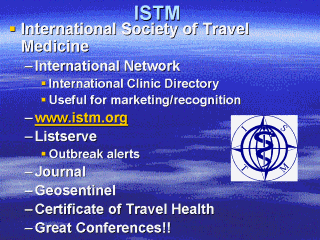| front |1 |2 |3 |4 |5 |6 |7 |8 |9 |10 |11 |12 |13 |14 |15 |16 |17 |18 |19 |20 |21 |22 |23 |24 |25 |26 |27 |28 |29 |30 |31 |32 |33 |34 |35 |36 |37 |38 |39 |40 |41 |42 |43 |44 |45 |46 |47 |48 |49 |50 |review |
 |
Some of the
important early initiatives of the ISTM were the provision of travel health
alerts to subscribers, a journal, biennial conferences, a global listing of
travel health practitioners, and a collaborative disease-reporting network (GeoSentinel)
with the Centers for Disease Control and Prevention (CDC) in Atlanta. More
recently, the ISTM has developed a certification program based on a detailed
Body of Knowledge in travel medicine leading to a Certificate of Travel
Health (Kozarski et al., 2002). GeoSentinel is an excellent example of the
contribution of travel medicine to the early detection and reporting of
imported infections (Freedman et al., 1999). Kozarsky PE, Keystone JS. Body of knowledge for the practice of travel medicine. J Travel Med 2002; 9: 112-115. Freedman DO, Kozarsky PE, Weld LH, Cetron MS. GeoSentinel: The Global Emerging Infections Sentinel network of the International Society of Travel Medicine. J Travel Med 1999;6:94-98. |